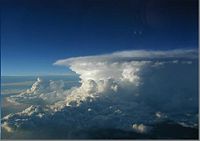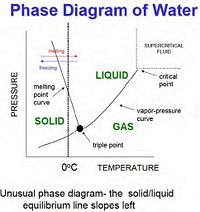Nucleation, droplets, and the physics of clouds
Nucleation is the process which results in the formation of a particle of a different thermodynamic phase from a solution, liquid, or vapor. This process occurs all throughout science and nature and has several applications, both harmless and dangerous, from the delicate formation of clouds to the explosion caused by placing Mentos in Coke. In nature this process occurs at an interface, such as the surface of a container which holds the fluid or the surface of a particle of dust which is in the solution. Nucleation that occurs in this situation is referred to as heterogeneous nucleation and happens much more often than homogeneous nucleation, which occurs in completely pure liquids. This type of nucleation requires activation by some kind of thermal excitation, such as supercooling or superheating the fluid.
{{#ev:youtube|g4kBNBEJKD8}} A more dangerous application of nucleation!
Phase Transitions
Nucleation Definition & Derivation



